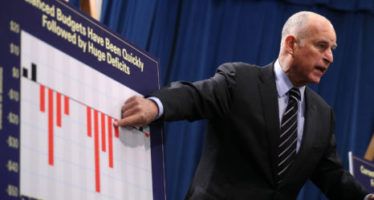Brown's Budget Shifts Much To Localities
JAN. 10, 2010
By WAYNE LUSVARDI
Gov. Jerry Brown’s budget fix is a topic of statewide social conversation but often misreported in the media.
Re:
Jerry Brown Wants to Tame Budget with Tax Extensions, Deep Cuts, LA Times
Anatomy of Brown’s Budget Plan, Sacramento Bee
Gov. Jerry Brown to Unveil Painful Budget, SF Chronicle
Jerry Brown’s To Do List Begins After Shock and Awe Monday, San Jose Mercury News
This writer was invited to a party in one of California’s most posh communities on Saturday night. Soon conversation got around to California’s budget crisis. Most of the highly educated persons at the party mistakenly thought that if new Gov. Jerry Brown can fix his stated $28 billion budget deficit California can right the listing ship of state from capsizing into an ocean of debt. Like the Greek mythical figure of Cassandra who was despised for being the messenger of hard truth, I had to explain that Brown’s fix is temporary and doesn’t begin to touch the looming wave of unfunded debt that will hit state, county, teacher and firefighers’ pension funds starting around 2014 and onward.
They were also misguided into thinking that the budget deficit for this year had mushroomed from $20 billion per year under Governor Schwarzenegger to $28 billion over night after Brown came into office and supposedly found that things were much worse than he expected. But the deficit-measuring period has gone from one year to 18 months to “magnify the problem.”
Both of the above misconceptions seem to derive from early statewide newspaper coverage of what to expect from the budget Brown rolled out today. The newspapers are not only failing to give Californians both the good and the bad news, however, but also any news of how California’s future budgetary liabilities might be effect the state.
Once again, newspapers tend to continue to misinform that it is the state that will go bankrupt when it is more likely to be counties, cities and special assessment districts that will be most vulnerable to insolvency. That is because Gov. Brown’s budget is diverting most of the budget decisions back to lower levels of government. Brown’s strategy is not to “spread the pain” as was done in the past as much as it is now to “localize the pain.”
Moreover, no change in existing bankruptcy law is apparently needed to rescue that state if unfunded budget liabilities are going to be dumped back on local government, as existing law is already in place for municipal bankruptcy.
CalPERS and CalSTRS are projected to have over a $250 billion of unfunded pension liability for 2009-10. But CalPERS and CalSTRS are socialized pension systems that every city and county or school district respectively pays into.
Once Brown crams down the liability to the local level, it may end up being “every man for themselves” as to whether they want to plug the pension fund liability gap. California may ‘not be alone” as the only state with these budget problems but the state may be telling local governments that “you’re on your own” now when it comes to plugging the gap in the structural budget deficit.
Perhaps the bigger unreported story is that this trend of returning funding decisions to the local level may sort of de-socialize the pension funds. Hence, there will be no more political vote buying by inflated promises of state legislators that presume a never-ending bubble economy and the money tree of bond financing. Budget balancing gimmicks may thus be a thing of the past.
The coming political crisis over public pension systems will thus not be solely played out in the state Capitol, but in city halls, county halls of administration and boards of education for each school district.
In essence, another big story underreported in the media is that the state is returning to the pre-Prop 13 situation where funding decisions were local. Only Prop 13 will still be on the books.
Thus, newly passed Prop. 25 which gives the state Legislature the capability to pass a balanced budget with merely a majority vote, rather than the supermajority vote previously required under Prop. 13, is a moot victory. Passing a balanced state budget will mean less than the budget battles expected to be going on at the local level.
The seeming clean sweep by Democrats of most of the political seats up for grabs at the city, county and school district levels in November 2010 may have been a Pyrrhic victory, because now those office holders will be put on the hot seat of whether they are going to raise taxes. And they will be facing the metaphorical pitchforks of the Tea Party and anyone who wants to form a coalition with them at their meetings. This is what Pseudodictionary.com calls a “Reverse Pyrrhic Victory” where you wipe out your adversary only to lose the war.
The Democrats can “butter up the GOP” all they want with concessions. But they might not foresee that the GOP could form a new coalition not just with taxpayers and small businesspersons but with the unemployed and those on welfare to reduce or eliminate the provision of luxury public goods and services that Brown is leaving untouched. This would diminish the Democrats’ political base with the wealthy and elite professional class. But this aspect of the budget story is unmentionable in the press.
There are a multitude of definitions of the word “fix.” So when we say that Gov. Brown’s proposed state budget is a temporary fix do we mean:
1. The act of putting something in working order again?
2. A condition or state of affairs almost beyond one’s ability to deal with and requiring great effort to bear or overcome?
3. A predicament; dilemma (informal)?
4. To place or person or group to ascribe blame to fix the blame on someone?
5. Something craved, especially an intravenous injection of a narcotic drug; “she needed a fix of chocolate”?
6. The act of restoring something to its original state?
7. To secure a noose?
8. Take vengeance on or get even; “We’ll get them!”; “That’ll fix him good!”?
9. Influence an event or its outcome by illegal means; “fix a race”?
10. An exemption granted after influence (e.g., money) is brought to bear “collusion resulted in tax fixes for gamblers”?
Possibly only in California would all of the above definitions apply. But perhaps the most apt definition is the Southern colloquial use of the word, which means, “to be on the verge of or in preparation for (doing a given thing).” So, California is just fixing its short-term budget deficit while only fixin’ to fix its long-term structural budget deficit. But apparently the media can’t get an accurate fix on that.
Related Articles
Car-mileage fee debate accelerates
The debate over gas taxes or mileage-based user fees to fund road construction and maintenance is accelerating. Proponents of gas
Is California budget as ‘balanced and progressive’ as Gov. Brown suggests?
SACRAMENTO – The California Assembly and Senate have until Thursday to approve the budget deal announced by Gov. Jerry Brown
May Revise Blows $6.6 B Tax Windfall
MAY 16, 2011 By JOHN SEILER Call it Government Math. In his January budget proposal for fiscal 2011-12, Gov. Jerry




